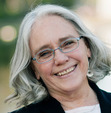Edith Maxwell's Blog, page 79
February 2, 2022
Love Kills
Our February theme for our Wicked Wednesdays is Love Kills. So Wickeds have your ever rooted for a killer in a book, TV show, or movie? Try to avoid spoilers or at least have a spoiler alert warning!

Sherry: I love Kelley Armstrong’s Nadia Stafford books about a police officer turned hit woman. This is what her website says about them: Law enforcement is in Nadia Stafford’s blood. She comes from a long line of police officers, and was one herself until the wrong case sent her over the line from dedicated cop to vigilante killer. I wish Kelley would have written more of them!
Edith/Maddie: I can’t think of any, although now I want to check out those Armstrong books, Sherry. But I have written several short stories of murderous revenge from the point of view of the killer. She always believes herself justified, of course! Sometimes she gets away with it…and sometimes she doesn’t.
Liz: Right now I’m reading Billy Summers by Stephen King. Billy is a hitman but he only kills “bad guys.” I’m only halfway through the book but I am definitely rooting for him!
Barb: I recently interviewed S.A. Cosby for the Friends of the Key West Library. (You can listen to the interview here.) In Razorblade Tears, Cosby manages to get you to root for and have sympathy for a man who was previously convicted of manslaughter, and that only because the charge was plead down from murder. Lots of people get killed in this book, but I resist labeling the protagonists as “killers.”
Julie: Rooting for the killer is a tough thing, but I’ve definitely rooted for people to get away with it. Murder on the Orient Express is a great example of that. When someone does a good job of creating motive, and makes the victim particularly vile, it’s often tough to root for them getting caught.
Jessie: I always love the notion of comeuppance and so I would have thought that rooting for the killer would be a part of that. But, somehow I cannot think of any that I quite feel that way about. I would say that I often read books with killers for whom I feel a great deal of empathy or compassion. I find I often write villains that tug at my heart strings too!
Readers: Have you ever rooted for a killer in a book, TV show, or movie?
February 1, 2022
An Exciting Opportunity for Cozy Writers
I’m thrilled to welcome back Phyllis M. Betz as our guest today. I met Phyllis at the Popular Culture Association conference in Washington DC a few years ago when I was on a panel. Since then she’s written Reading the Cozy Mystery: Critical Essays on an Underappreciated Subgenre. She has an exciting new project in development.
Call for Submissions
I am Phyllis M. Betz, the editor of the anthology Reading the Cozy Mystery, and I am asking if any of you would be interested in submitting a short [2,000-3,500 word] essay that discusses your approach to your work for a companion anthology. The tentative title is Writing the Cozy: Cozy Authors on their Craft.
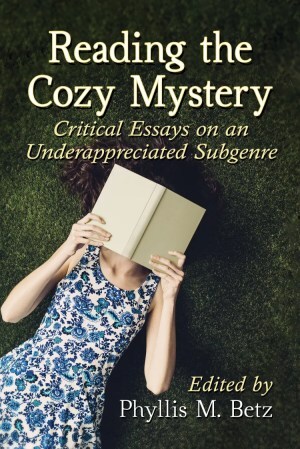
The anthology would be organized into major sections that focus on key aspects of the cozy:
Characters: how you develop a character, how do you keep the character fresh, how/when do you decide to incorporate new a character, how do you handle the romantic relationships between characters
Setting: how do you decide where to set you mysteries, how much research of the place do you do, are some settings less suitable to the cozy
Series: how do you decide to create a series, how do you determine when a series has run its course, how do you manage writing multiple series concurrently
Genre: how do you keep the basic genre conventions fresh, what do you think of the current focus on genre blending [cozy noir/cozy horror]
Racism, economic imbalance, violence, and other social issues: how do you consider whether the novel will include these into the narrative
Reception of the cozy
These are only suggestions; please feel free to discuss other concerns related to your writing.
The model for my approach is the 1992 anthology Dangerous Men and Adventurous Women, edited by Jayne Ann Krentz, which brought together 22 romance authors to discuss their work
I have approached McFarland & Company, the publisher of Reading the Cozy, and they have expressed interest in the project.
If you would be interested in participating in this project, please contact me at betz@lasalle.edu. I would wish to know, at first, if you are interested and the topic you would like to engage with. Once I have a sense of interest and the range of topics, I will then be able to develop a timeline for the project.
Thank you for your interest; I look forward to your reactions.
Biography: Phyllis M. Betz teaches English literature and composition. She also words in the field of popular culture and literature and has written three books on lesbian popular fiction.
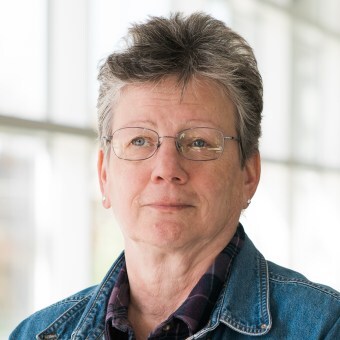
January 31, 2022
A Wicked Welcome to Nikki Knight **plus a giveaway!**
by Julie, having survived the winter storm over the weekend in Somerville
I am so glad to introduce you all to Nikki Knight, who you already know as Kathleen Marple Kalb! Her new series launches February 7, and she’s here to tell us all about it.
Call Me Anything, Just Call Me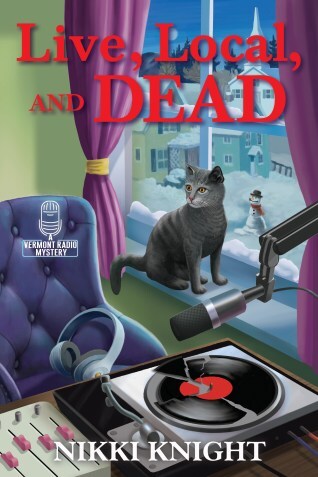
Writers really vex about pen names.
When my agent was shopping my first historical mystery, he wasn’t sure I should use my real maiden name: Marple. He thought it was a little too much. I said I’d been Kathleen Marple Kalb on the air in New York for years now, and editors, and later readers, might remember the name.
Plus the fact that I’d spent most of my adult life showing my driver’s license to prove that I really was born Miss Marple. There’s a long history of memorable fake names in radio. But mine isn’t one of them!
So, Kathleen Marple Kalb I stayed, on the air, and on the cover of the Ella Shane historical mysteries for Kensington.

But then, when Crooked Lane picked up LIVE, LOCAL, AND DEAD, my first contemporary mystery, set at a Vermont radio station, a pen name was part of the deal. I saw it through the lens of radio: my traffic reporter buddies have always used different names on different stations, even though everyone recognized their voices and knew it was the same person.
So that part wasn’t too tough.
Coming up with the actual pen name, though?
That was a challenge.

Much earlier in my writing journey, before I realized that I’d need every single scrap of potential connection to agents, editors, and readers, I’d noodled about possible pen names. I always leaned toward family names, like my grandmother’s perfectly old-fashioned first name, Violet. Or maybe my son’s first name as a last name. I’d read that Elizabeth Peters, aka Barbara Michaels, one of my favorite authors, used her kids’ names, and that sounded like a nice way to honor my family.
But I couldn’t. My husband and I have always kept a firewall around our son’s privacy. On my social media, he’s “the Imp.” In this scary world, I just don’t want my boy’s real name out there. We’re determined to protect his privacy…even if he’s going to throw it all away in his first week of college!
So what on earth to call myself?
I thought about honoring some of my radio pals – I almost picked “Julie Belmont,” for my best beta reader and my favorite on-air partner. Or maybe Winnie Something, a tip of the cap to my current employer, 1010 WINS.
Finally, it hit me.
If I’m going to use a pretend name on a book about a DJ, why not choose a really classic name for a woman jock? And why not have fun with it? Crystal Starr was in play for a minute or two, until I ran it past my husband.
He laughed. And then, doing his very best imitation of my radio voice, he pronounced it: “Nikki Knight.”
Perfect.
More perfect than even he realized – in the run-up to publication, I’ve had people reaching out to me and asking if I’m the Nikki Knight they worked with way back when.
Probably not.
But more evidence that I chose the right name: a tip of the cap to radio, a long line of women DJ’s who’ve worked their way into the business…and especially, to my husband, who not only gave me his name, but mine!
Question: Readers, do you think much about a writer’s name, or do you just accept it at face value? (One randomly chosen commenter gets a copy of LIVE, LOCAL, AND DEAD)

ART: Author photos taken by Steven Kalb, 1010 WINS studio picture from my personal collection.
Nikki Knight is the pen name of award-winning radio news anchor and mystery writer Kathleen Marple Kalb. She writes the Ella Shane historical mystery series for Kensington, and her short stories appear in several anthologies. Her “Bad Apples” was an Honorable Mention in the 2021 Black Orchid Novella Contest.
LIVE, LOCAL, AND DEAD (2/8/22) follows New York City DJ Jaye Jordan’s new start at a tiny Vermont radio station, after her husband survives cancer but their marriage doesn’t. She thinks she’s got enough trouble with protests because she replaced angry talk with love songs…and then the talk show host turns up dead in a snowman in front of the station. Plus, her second-chance romance with her old crush – the governor – turns out to be much more dangerous than either of them expected. Add in a colorful cast of locals, the cranky station cat Neptune, and Charlemagne the Moose, who has flatulence issues…and it’s more fun than anyone should be allowed to have in maple sugaring season.
Buy: https://www.penguinrandomhouse.com/books/695810/live-local-and-dead-by-nikki-knight/
January 28, 2022
A Wicked Welcome to Karen Odden! **plus a giveaway**
by Julie, wintering in Somerville
I am delighted to welcome Karen Odden to the blog today! I love this origin story for her latest novel.
Ripping Out PipesThanks so much for having me, Wickeds! I felt honored when Julie invited me.
I love your theme this month of “Out with the old (and in with the new)”—maybe because it feels remarkably apposite at the moment, for both my life and my writing.

Back in September, a pipe burst in my son’s bathroom. Believe me when I say water is a force, and it soaks into walls fast! The mitigation company chopped holes through ten walls and installed fans to prevent mold. Next, our hot water heater broke, spewing water everywhere. Yet more holes! Then a pipe burst in our attic. Our plumber showed me the broken pieces: “This is cheap pipe, Karen. It’s going to keep happening.” We got the message: we needed to repipe our entire house. The plumbers cut yet more holes. (!!) There was dust everywhere. In a word: disruption.

It felt like an apt metaphor for my writing life because with Down a Dark River, I realized—in retrospect—I had to do the authorial version of cutting through the drywall, taking out some old pipes, and putting up with dust during a slow rebuild.
All my books are set in the world of 1870s London, a period I’ve researched extensively beginning with my dissertation at NYU. My first three novels feature different young women protagonists who become amateur detectives because someone they love has been injured or died. These books tend to be intimate, with deeply personal stakes, and follow in the vein of some old favorite books by Mary Stewart, Daphne DuMaurier, and Phyllis Whitney.
But then I came across a story that clawed at me and inspired Down a Dark River.
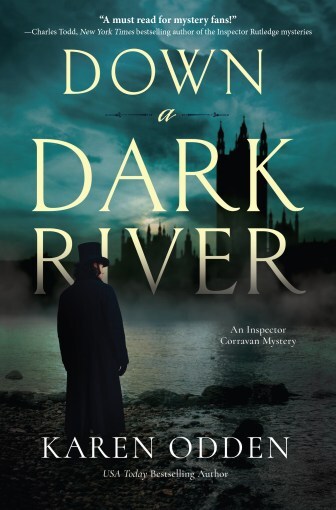
I found it in a contemporary article about race and the law in the US. A young Black woman in Alabama was jaywalking across a quiet street when she was hit by a car, driven by a wealthy white man who was intoxicated. She suffered terrible injuries, and when her family sued, the judge awarded her a piddly $2,000. Outraged, her father took an unusual step: he threatened the judge’s daughter. To my mind, he wanted to show the judge what it was to almost lose a child. I found myself compelled to write a book about failures of empathy and the desire for revenge.
However, if I wanted to set this mystery in 1870s London, I needed male characters. In Victorian England, the judges, the police, and barristers are all men. (Women weren’t allowed into the Met Police or onto juries until around 1920.) So I couldn’t write a book with a young woman amateur sleuth. This was a “rip out the old pipes” moment.
From the beginning, the book felt darker and more ambitious. I dug deeper into my own “foul rag-and-bone shop of the heart” for the ugly moments when I felt the sting of injustice, when I wished for revenge, when I was full of regret for mistakes I made. It was emotionally uncomfortable but creatively productive. To develop Inspector Michael Corravan, I spent hours reading male protagonists in The Bourne Identity, Faithful Place, and the Bosch novels, and Victorian police reports (all written by men, of course) out loud, to train my ear.
For Down a Dark River, and its sequel coming in November 2022, I removed some old writing pipes and put up with some disruption to find new ones. You can’t see them, but I know they’re there, and I feel the difference as I sit down to write.
Readers: Can you recall a time when you’ve had to “reboot” or step backward in order to make progress? Or step out of your comfort zone to grow? I’d love to hear. I’ll send a signed copy of Down a Dark River to one commentor (US only).
ABOUT THE BOOK:London, 1878. One April morning, a small boat bearing a young woman’s corpse floats down the murky waters of the Thames. When the victim is identified as Rose Albert, daughter of a prominent judge, the Scotland Yard director gives the case to Michael Corravan, one of the only Senior Inspectors remaining after a corruption scandal the previous autumn left the division in ruins. Reluctantly, Corravan abandons his ongoing case, a search for the missing wife of a shipping magnate, handing it over to his young colleague, Mr. Stiles.
An Irish former bare-knuckles boxer and dockworker from London’s seedy East End, Corravan has good street sense and an inspector’s knack for digging up clues. But he’s confounded when, a week later, a second woman is found dead in a rowboat, and then a third. The dead women seem to have no connection whatsoever. Meanwhile, Mr. Stiles makes an alarming discovery: the shipping magnate’s missing wife, Mrs. Beckford, may not have fled her house because she was insane, as her husband claims, and Mr. Beckford may not be the successful man of business that he appears to be.
Slowly, it becomes clear that the river murders and the case of Mrs. Beckford may be linked through some terrible act of injustice in the past—for which someone has vowed a brutal vengeance. Now, with the newspapers once again trumpeting the Yard’s failures, Corravan must dredge up the truth—before London devolves into a state of panic and before the killer claims another innocent victim.

USA Today bestselling novelist Karen Odden earned her PhD in English at NYU. Her four novels, all set in 1870s London, have won awards for historical fiction and mystery. Her e-newsletter publishes every 6 weeks, featuring exclusive content and essays and giveaways by guest authors. Connect with Karen at http://www.karenodden.com.
January 27, 2022
The Art of Finishing
By Liz, doing my best to embrace the chilly weather here in the northeast
I just finished Witch Way Out, the third book in the Full Moon Mysteries (yay!). As most authors do, I love finishing a book. I feel so free. Well, for about a day, before I start the next one.
But also I hate finishing books, in the literal sense. Like, the actual last few chapters are the worst part for me. Almost worse than the slog through the middle.
I’m not sure why it’s that way. I usually have a decent idea of what the ending is going to be while I’m writing, although it’s a little more foggy than the rest of it. But for some reason, the end is always the part that’s never quite there, usually until the rest of the book has been written and edited a couple of times. Which can be kind of frustrating, because I see other writers talk about that sense of completion when they finish a first draft, before they jump into editing and I have LITERALLY never had that. It’s like one big continuation of editing and trying to finish and I always end up feeling like I’m doing it wrong.

I have gotten better with that last part. Somewhere along the way I accepted that my process is my process, and it’s okay. Everyone’s process is different, and one is not better than another as long it eventually gets written. I’m not actually looking to change it anymore—and trust me, I spent a lot of time trying to change it in the past. No, I’m talking about the part when the rest of the book has been edited to death, and the only thing left are the final couple of scenes…and I just keep putting it off.
I’ve thought a lot about this. Part of it is that I’m a recovering procrastinator, still trying to embrace those tasks that are harder than others. Someone also suggested once that there may be a bit of not actually wanting to finish the book because then it’s over and there’s some fear of what’s next. Mostly, though, I think it’s a constant worry that I won’t get the end quite right and it’s clearly a pivotal part of the book.
I know intellectually that this is silly. I mean, I just turned in my sixteenth book, so I must know how to write…right?
In addition to being a recovering procrastinator, I guess you could say I’m also a recovering perfectionist. I know how damaging it is to worry so much about getting things perfect that the thing never actually gets anywhere. I’m making a concerted effort to notice when I do this and, well, stop. The first step to recovery is being aware there’s a problem, I’ve heard.
So I recently put up a reminder above my desk with Sheryl Sandberg’s quote “Done is better than perfect.” It’s a daily nudge that tells me to just get somewhere, because somewhere is definitely better than nowhere—and much easier to fix.
Readers, do you suffer from perfectionism? How do you combat it? Leave a comment below.
January 26, 2022
Out with the Old: New Book Rituals
Out with the old, in with the new. Wickeds, do you have any rituals you do before you start a new book?

Sherry: I don’t have any rituals per se but I do have some pondering to do. If I read something really dark do I want to read something lighter? Or is my mood still dark and I want to keep going down that path? Or maybe I want to switch genres for a bit. I end up staring at my ever growing TBR pile and sometimes it takes reading several first pages before I settle on a new book.
Jessie: I always start new novels by asking myself questions in a notebook. The practice has come to take on a sort of ritualized quality since I almost always use the same sort of notebook and I tend to use a stub-nib juicy pen. I block out chunks of time on my schedule and settle in at my desk and just start writing down questions about the novel which I answer in a variety of ways. I always know that a novel is going to come into being when I feel an overwhelming urge to get a notebook started. I keep a stash of the ones I like on hand since it has proven a successful ritual thus far!
Edith/Maddie: I’d like to say I start a new notebook like Jessie, or clean my desk as some do. Sadly * I do neither. I might give myself a week to focus entirely on a short story, and last December I took an unheard-of week’s vacation after I turned in a book. But when I’m finishing a manuscript, the new story is already knocking at my brain. I set up my Scrivener project, pace back and forth while I find a perfect first line, and off I go. *I’ve stopped saying things like “sadly” about my practices. They work for me, and I’m happy and productive – what more could I want?
Barb: For new books, I’ll start a Levenger Circa notebook for the book. Usually the synopsis has been turned in to my editor some time before, so I’ll put that in and any notes I have (or stickies if I’ve worked with Jessie on the plotting). I’ll start a new Scrivener doc and transfer the synopsis into scene titles in the document and add a new folder on my desktop for all the other stuff that is related. I don’t joyously start a new book because first drafts are my least-liked part of the process, so breaking the startup down into all these little component parts helps me find my momentum.
Liz: Jessie and Barb, I love the ideas of notebooks! I may have to try one when I start my next book. Usually I have an idea of what my overall plot is and then I have a plotting session with Jessie, which helps me get the actual synopsis done. From there I create a Scrivener doc and start putting in whatever scenes I have. Then I start writing and hope it turns into a book…
Julie: I have a notebook where I’ll start jotting ideas as they come to me. I don’t try to have them make sense, I just take notes. When I feel like I’ve got an idea forming, I start bullet pointing some scenes, naming characters, etc. Then I’m on to the plotting (on notecards) and Scrivener. Then I begin writing. I do love starting a new book.
Writer friends, any rituals for starting a new book? Reader friends, how do you cleanse your palette between books, or genres?
January 25, 2022
A Wicked Welcome to Olivia Matthews!
by Julie, making soup in Somerville
I’m delighted to welcome Patricia Sargeant, otherwise known as Olivia Matthews, to the blog today. Patricia and I recorded a great conversation for the Sisters in Crime podcast recently (it will be released later this winter), and I’m thrilled to let you know about this multi-published author.
Ordinary People in Extraordinary SituationsThank you to The Wickeds authors for inviting me to spend the day with your community. I’m honored and excited to be here.
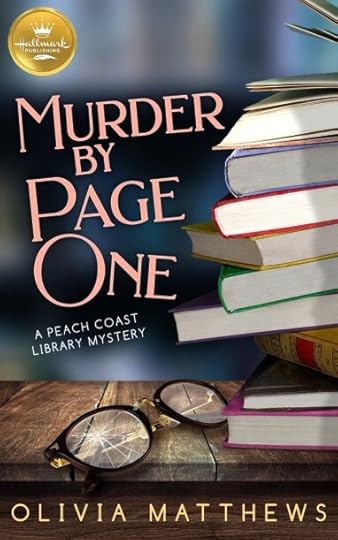
I write cozy mysteries as Olivia Matthews. My first cozy mystery trilogy, the Sister Lou Mysteries, debuted in 2017. The amateur sleuth was a Catholic sister. I’m working on my second cozy mystery series, the Peach Coast Library Mysteries, which features a fish-out-of-water librarian as the amateur sleuth. I’m looking forward to introducing my third cozy mystery series, the Spice Isle Bakery Mysteries, in 2023. The amateur sleuth is the owner/manager of a family-owned West Indian Bakery.
One of the reasons I enjoy writing cozy mysteries is that I love putting ordinary people in extraordinary circumstances to make them find the Hero Inside. Even when I wrote romantic suspense, my protagonists were people like me. One was a sci-fi writer. The other was a newspaper reporter. But I digress.
With cozy mysteries, we don’t have to feature law enforcement, or active or retired military personnel. Our protagonists don’t have to be experienced or proven when it comes to fighting crime. They just have to be motivated and earnest. They just have to try. If they bumble and stumble their way through an investigation, we grade them on a curve. We understand this isn’t their usual dance. If they need a pep talk before confronting a suspect, we empathize. We’re not comfortable with confrontations, either. And there’s no shame in screaming in fear during a dangerous scene. Heck, we’d scream, too.
Featuring people like me – people without experience, without training – as the sleuths in my stories also is a form of positive visualization. I imagine I’m in a situation like the one I’m writing. What would I do? How would I handle it? If my first guess doesn’t work out, I can revise it, hoping for a better outcome. That way, I’d have a plan if a homicidal maniac ever chased me along a jogging trail.
What about you? Do you prefer investigators who are “ordinary” people like Agatha Christie’s Ms. Marple or law enforcement protagonists like her Hercule Poirot? Do you put yourself in the role of the sleuth? You can tell us. This is a safe space.
Thanks again for allowing me to hang out with you. I look forward to reading your thoughts on cozy mystery sleuths.
About the AuthorOlivia Matthews is the cozy mystery pseudonym of national best-selling and award-winning author Patricia Sargeant. Her mysteries put ordinary people in extraordinary situations to have them find the Hero Inside.
Website: https://PatriciaSargeant.com
Twitter: @BooksByPatricia
Facebook: @AuthorPatriciaSargeant
About the Peach Coast Library MysteriesMarvey’s a librarian from Brooklyn who makes book-themed jewelry as a hobby, looks after her cranky cat, and supports events for readers and authors. She’s still adjusting to quirky small-town life in Georgia—and that’s before she discovers a dead body in a bookstore.
When her new best friend becomes a suspect, Marvey develops a new hobby: solving a murder mystery. With her talents for research, her knowledge gleaned from crime novels, and a whole lot of determination, she pursues the truth. But even as she gets closer to it, could she be facing a deadly plot twist?
January 23, 2022
Murder in a Cape Cottage Cover Reveal, plus #giveaway!
Edith/Maddie north of Boston, taking January as it comes.
I’m so excited to introduce you all to Murder in a Cape Cottage, Cozy Capers Book Group Mystery #4! I loved writing it, and now have both a cover and a release date. It will hit the bookshelves – actual and virtual – on September 27 (which is four days after what would have been my mom’s 97th birthday). Read down for a giveaway.
Here’s the blurb:
Cape Cod bike shop owner Mackenzie “Mac” Almeida and her book club sleuths uncover a case that strikes too close to home . . .
ʼTis the week after Christmas. It’s just as well Mac’s Cozy Capers Book Group’s new pick is a nerve-soothing coloring book mystery, especially because she has last-minute wedding planning to do. But all pre-wedding jitters fade into the background when Mac and her fiancé, Tim, begin a cottage renovation project and open a wall to find a skeleton—sitting on a stool, dressed in an old-fashioned bridal gown . . .
As Mac delves into the decades-old mystery with the help of librarian Flo and her book group, she discovers a story of star-crossed lovers and feuding families worthy of the bard himself. Yet this tale has a modern-day villain still lurking in Mac’s quaint seaside town, ready to make this a murderous New Year’s Eve . . .
And here’s the pretty cover!

It looks like a Christmas book, but it’s a post-holiday ticking clock story, instead, although Mac does attend a Hanukkah party at Zeke and Stephen’s home. It was so fun to include one of Krista Davis’s adult coloring book mysteries for the book group to read – not that Mac ever finds time to actually do any coloring.
I loved learning about how a corpse might be preserved after ninety years inside a wall, researching clothing from 1940, and so much more. And to include the happy occasion of a wedding at the end.
The release date also marks ten years since my first book was published, almost to the day. Champagne, please! Here is the re-issued version of Speaking of Murder with its gorgeous new cover.

Lauren Rousseau, a college linguistics professor, also lives in a coastal town in Massachusetts, but one a bit farther north than Cape Cod.
Readers: Do you like a little history mixed in with your contemporary mystery? What are your favorite books that bring the past into the present? I’ll send one commenter one of my Cozy Capers Book Group Mysteries, your choice!
January 21, 2022
A Wicked Welcome to Lynn Cahoon **plus a giveaway**
by Julie, sipping a London Fog in Somerville
I’m delighted to welcome Lynn Cahoon back to the blog to celebrate the sixth, and last, book in her Farm to Fork series.
A Fatal Family Feast – Farm to Fork book #6Hi Wickeds! Big thanks to Julie Hennrikus who invited me to come play with you all today.
For those of you who don’t know me, I’m Lynn Cahoon, cozy mystery author. I’ve been writing in my cozy worlds since the release of the Tourist Trap mystery series in July of 2014. My publisher asked for three books in the cozy coastal California town of South Cove in this bookstore set series and we release them in what they considered a fast release. Now Tourist Trap is up to lucky number 13 (WEDDING BELL BLUES) releasing this year.
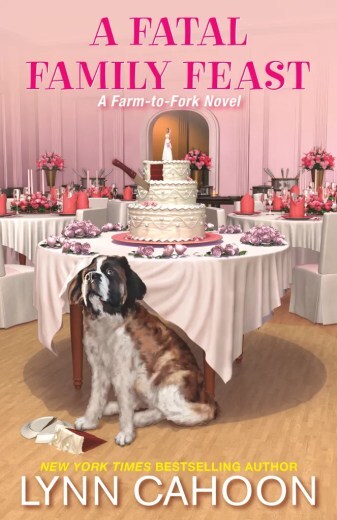
I also write the Cat Latimer mystery series, set in Colorado with a paranormal author sleuth who opens a writers retreat in an old Victorian. Although my publisher has stopped the series, I’ve been given the rights to continue these stories, so number 8 will release this fall.
Last year I started a new series, set in the magical mountains of Idaho around a catering director who’s also a kitchen witch (THREE TAINTED TEAS will release in April in The Kitchen Witch mysteries.)
And later in 2022, a new series set in a new age Sedona bookstore will start with an owner who is a cancer survivor and her new book club that likes to solve murders. (TUESDAY NIGHT SURVIVORS’ CLUB, part of the Survivors’ Book Club mysteries.)
Whew, that’s a lot, right? Well, when some things start, others must end to make room for the new. And that’s what’s happening with my Idaho set Farm to Fork series. A FATAL FAMILY FEAST, came out this month and is the last book featuring the farm to table restaurant, The County Seat, and it’s owners and kitchen crew. I loved writing these books (and the three novellas that fill out the series.) It was like going home.
Angie and Felicia open The County Seat in an old building in fictional River Vista which is right across the street from the city park. A park, in the real town where I grew up, that held the town’s founding festival each year. From the street dance that Friday night, a parade on Saturday, and a carnival that set up outside the park where the city now has built a greenbelt, the town and all the surrounding farm residents celebrated the bounty of summer and the coming of fall and the harvest.
The festival was where I met my first boyfriend who was from a totally different ‘group’ than I hung out with. I was the good kid – a book worm who cared if I aced the test or not. Kirk. on the other hand, was one of the guys who hung out across the street before school started because they could smoke there without getting in trouble. But love blooms like a flower in a crack of a sidewalk, not in the right place all the time. And Lynn has a thing for bad boys.
When I was planning out this last book, I knew I had to marry off at least one of my Scooby Do couples. And Angie wasn’t there yet. So it had to be Felicia and the County Seat’s kitchen second in command, Estebe. Felicia is from back east and although we hadn’t talked a lot about her background, she was raised with money. Estebe made his own fortune and, although he’s rich now, you wouldn’t know it. He’s a hard worker with a history of having short temper that can get him in trouble.
The bar hopping scene for the bachelor/bachelorette party is based on what I imagine Boise is like now. The places may change names and locations, but the feel of a big, small town, is Boise’s claim to fame.
Now that I’m not writing in the Farm to Fork series anymore, I’ll have to take my Kitchen Witch crew down to the valley to get my Boise visit fix. Maybe a dinner theater is on the menu. Or maybe a visit to a farm to fork restaurant that isn’t part of a current series anymore. And just so happens to have a St. Bernard mascot sitting outside near the front door.
It’s hard to give up writing a series for the author. Especially in the cozy world where we get so involved in the town and characters. I’m that way when my favorite television shows get cancelled. Especially when there are loose ends.
Readers, what’s one series that you wish had run longer? I’m giving away an e-copy of A FATAL FAMILY FEAST to one lucky commenter.
A FATAL FAMILY FEAST.Angie Turner’s Idaho restaurant, the County Seat, is the perfect site for a picturesque country wedding, but the party planning skids to a halt when the groom-to-be is implicated in a murder investigation…
When Angie’s best friend and business partner, Felicia Williams, picks the County Seat to host her upcoming nuptials, Angie wants it to feel like a family affair–especially since Felicia is set to marry the farm-to-fork restaurant’s talented sous chef, Estebe Blackstone. Unfortunately, the bride’s actual family is far less enthusiastic about the union. They’re pulling out all the stops to cancel the couple’s wedding, even arranging for a surprise visit from Felicia’s ex-fiancé (and her father’s current lackey). But when her ex is killed days before the ceremony and Estebe is framed for the crime, Angie and the County Seat crew must scramble to solve the murder and save the wedding . . .
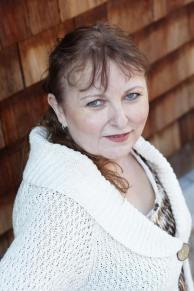
Lynn Cahoon, author of A Killer Christmas Wish, a Cat Latimer mystery, is a NYT and USA Today bestselling author of the Tourist Trap, Kitchen Witch, Cat Latimer, Survivors’ Book Club, and Farm-to-Fork mystery series. No matter where the mystery is set, readers can expect a fun ride. Find out more at her website www.lynncahoon.com
January 20, 2022
Genre Hopping with Kristin von Kreisler **plus a giveaway**
by Julie, enjoying sorting my pile of books in Somerville
I am delighted to welcome Kristin von Kreisler to the blog today! Kristin writes women’s fiction, and today she’s writing about why her books always feature a dog.
A Reason for HopeThank you for inviting me to write a blog post and for featuring A Reason for Hope on the Wickeds today.
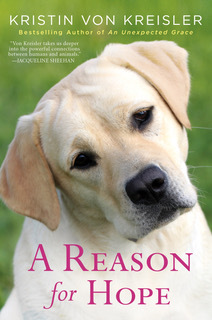
Though I don’t write cozy mysteries, I do make sure my novels contain suspense. As for my genre, it’s hard to say. I write about contemporary issues and always insert a loveable dog into each story.
Why a dog? Of course, because I adore dogs, but also because they serve literary purposes. In A Reason for Hope, for example, a bookmobile librarian fights for justice after a grievous assault, and to take the sting out of that hard subject, I have Hope, an adorable Lab courthouse facility dog, comfort her through stressful police interviews, depositions, and court appearances. As Hope wins the readers’ hearts, she makes the serious theme of assault more palatable. You might say that she adds the “cozy” to the story.
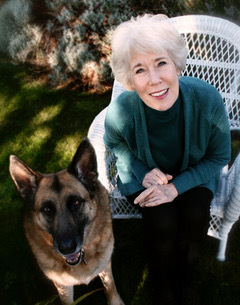 Photo of me with my late German shepherd, Bridget (photo by Jordan Taylor)
Photo of me with my late German shepherd, Bridget (photo by Jordan Taylor)Dogs also help my characters heal, sometimes physically, but always emotionally. Studies have shown that dogs lower our heart rates and blood pressure. They decrease our cortisol, a stress hormone, and they increase the dopamine and serotonin that calm us. Hospital patients visited by dog report less pain. Reassured by fictional dogs, my characters gain similar feelings of wellbeing—and I believe that when readers enter my fictional world, they also vicariously pick up the comfort and security that the dogs provide.
Dogs can be supremely sensitive to us. They know our feelings sometimes better than we do. Once they pick up our moods, they enter what researchers call “attunement,” meaning that they align themselves with our emotions, get in sync with us, and very often try to help.
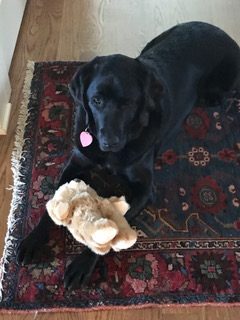 My new dog Ebby with her teddy. Ebby is former courthouse dog, like Hope.
My new dog Ebby with her teddy. Ebby is former courthouse dog, like Hope.A real-life galumphing black dog named Chuckles was a model of attunement when he watched his human, who’d just had a chemo infusion, collapse on her sofa one afternoon and cry until she fell asleep. When she woke, Chuckles was waiting, and she was covered with a squeaky carrot, balding teddy bear, decapitated tiger, and worn-out tennis balls. The woman said, “Chuckles brought me all his toys to comfort me. He gave me everything he had.”
Generosity is one of many things we can learn from dogs, and with love and kindness, my fictional dogs have much to teach my characters. The dogs are shining examples of resilience, courage, and forgiveness, which are what my characters need to cultivate in order to heal from their trials. The dogs are guides and models, and their mentoring, though subtle, changes lives.
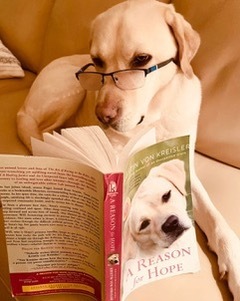 Wilson, a yellow Lab enjoying my new novel (photo by Sheryl Speight)
Wilson, a yellow Lab enjoying my new novel (photo by Sheryl Speight)That’s why I always put dogs in my novels. They bring humor to serious subjects and hope to seemingly impossible struggles. I call on dogs to temper upsetting scenes and offer relief after brutal acts. Most of all, I ask dogs to do what they do best, and that is to embody the love I want to shine through my stories. Like love, the dogs are a powerful force for the good.
Readers, have you found dogs in cozy mysteries you’ve read? Has a dog ever helped you through a hard time? Let me know in the comments. I’ll give one book away to a commenter on the blog.
About A Reason for Hope:“A Labrador retriever named Hope brings comfort to a woman struggling with the ramifications of her sexual assault… The theme is so powerful that A Reason for Hope will resonate with readers.” —Booklist
Bio: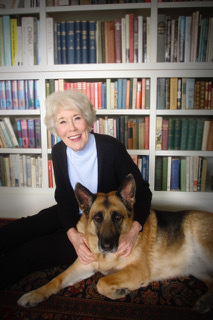 Photo of me and Bridget at home (photo by Jordan Taylor)
Photo of me and Bridget at home (photo by Jordan Taylor)Kristin von Kreisler is the award-winning, bestselling author of novels, nonfiction books, and articles about animals, a career that has found her following a grizzly bear and hang gliding to experience the sensation of eagles soaring through the sky. She lives in a restored Victorian farmhouse in Washington with her husband and their beloved Lab Ebby. http://www.kristinvonkreisler.com

